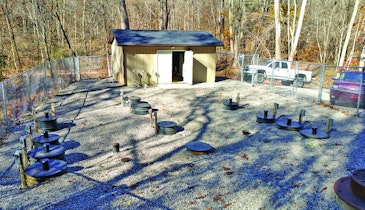Five years after contaminated water in Flint became a national news story, Michigan’s governor announced a huge infrastructure bill that addresses water quality on several levels.
With a combination of federal money, borrowing, and a one-time appropriation, the state will invest $500 million in water infrastructure. Of that amount, $35 million will be marked for low-interest loans to homeowners and communities to replace or eliminate failing onsite systems, news reports said. About 30% of Michigan homes use onsite systems.
Among other expenditures, the project would also spend $207 million on work such as replacing lead service lines in disadvantaged communities and addressing PFAS chemicals.
The variety of funding sources means the work can be done without a tax increase, Gov. Gretchen Whitmer said in a statement.
The project will need the approval of the state’s Republican-controlled legislature, and one legislator already expressed support. "Having access to quality water is a fundamental, basic need that every Michigan family should have the right to,” said state Sen. Rick Outman, R-Six Lakes. He said he looks forward to seeing details of the proposal.
The Michigan League of Conservation Voters and Michigan Agri-Business Association also expressed support.
Suffolk County bill requires advanced onsite treatment to reduce nitrogen pollution
The Suffolk County Legislature unanimously approved a bill to require advanced onsite treatment for many home and commercial installations.
The legislation would take effect in July 2021, and it is the latest action in the county to reduce nitrogen pollution of its near-shore waters. Suffolk County, New York, occupies the eastern tip of Long Island and includes the wealthy Hamptons communities. Cesspools were the treatment system of choice for decades, and the county has thousands in place.
Republicans concerned about the cost for homeowners stalled the bill for about a month, reported Newsday. The bill was amended so it applies to fewer types of renovations. It was also amended to apply only to home expansions that create more than five bedrooms and increase the building’s footprint. Originally the bill required advanced treatment if the number of bedrooms in a home increased.
Another amendment exempted construction within a sewer district because of concerns that residents would spend thousands on an advanced onsite system that would have to be abandoned when municipal sewer becomes available.
In total the county is planning a 50-year, $4 billion program to replace cesspools and old septic systems.
County on track for record number of onsite installations
Mower County, in the southeastern corner of Minnesota, next to Iowa, is on track for a record number of onsite system installations in 2020. Officials are expecting to have 120 systems in the ground, said news reports.
That would mean no carryover of projects to 2021, said Angela Lipelt, the county’s environmental services supervisor. She said a strong real estate market, and the accompanying review of systems in the ground, was responsible for some of those jobs. The number also reflects the county’s long-running initiative to achieve septic system compliance. Another factor was wet weather last year that delayed construction work.
Conservation group will sue Massachusetts DEP over pollution around Cape Cod
An interest group announced its intent to sue two towns and the state in order to stop septic system pollution in the waters around Cape Cod.
The Conservation Law Foundation said it will sue the towns of Barnstable and Mashpee, and the Massachusetts Department of Environmental Protection.
“These three entities have utterly failed to protect Cape Cod’s waters,” said Christopher Kilian, vice president of strategic litigation at the foundation, according to the Cape Cod Times in Hyannis, Massachusetts. “Until they get this problem under control, the installation of new systems and the inspection of properties that rely on septic inspections must be halted.”
He said the foundation wants the moratorium in place until there is a remediation plan with implementation targets. The foundation is concerned about toxic algae blooms fed by nitrogen and phosphorus from septic systems. Kilian said the suit will also ask for an order commanding the state to develop training materials and a standard policy for approving onsite system inspectors.
Communities around Lake George want to require POS onsite system inspection
The Town of Dresden, New York, may follow other municipalities around Lake George by requiring an onsite system inspection before any transfer of property. A citizen addressing the Town Board in September said she gathered more than 200 signatures from people who are interested.
Communities around Lake George, in the southeastern corner of the state’s Adirondack Park, have enacted similar ordinances. Their intent is to prevent pollution of the lake by failing onsite systems.
Like some other communities around Lake George, Queensbury adopted a rule requiring an onsite system inspection before the transfer of property. After about two years of mandatory onsite inspections, a Queensbury official recently noted the success of the rule and the need for it.
“Almost 80% of those systems being inspected needed some attention,” Supervisor John Strough told The Post-Star of Glens Falls. “For most of them, it was a relatively small adjustment, but it improved the system.”Problems found, said Dave Hatin, director of building and codes, include baffles that fell off and distribution boxes that are not level, which puts too much stress on one part of a system.
South Carolina environmental groups seek change to onsite maintenance rules
South Carolina health officials are in the process of revising onsite system regulations, and environmental groups have an idea of what the revisions should include.
“What we’d like to see is a robust inspection, maintenance and reporting program for septic tanks,” said Andrew Wunderley, the Charleston Waterkeeper.
Once tanks are in the ground, there are no major requirements for maintenance or operation, he said, according to WCSC News of Charleston.
The Coastal Conservation League and the South Carolina Environmental Law Project are joining the Waterkeeper in asking for changes to onsite rules.
Wunderley said the groups would also like the state to focus resources on areas where people are most affected by bacterial pollution.






